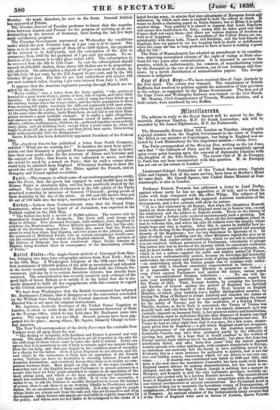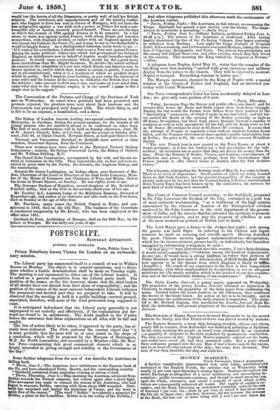ZiortIlautung.
The address in reply to the Royal Speech will be moved by the He- nourable Algernon Egerton, M.P. for South Lancashire, and will be seconded by Sir James Elphinstone, M.P. for Portsmouth.
The Honourable Henry Elliot left London on Tuesday, charged with a special mission from the English Government to the court of Naples. Mr. Elliot is our minister at Copenhagen' but being in England was se- lected by Lord Malmesbury for this important mission.—Daily News.
The Paris correspondent of the Morning Post, writing on the 1st June, says that "the Cabinets of Paris and St. James's are completely agreed upon every point bearing upon the renewal of diplomatic relations with the kingdom of the Two Sicilies. The recent visit of M. de Persigny, to Paris has not been unconnected with this question. M. de Persigny has set out on his return to London."
Lieutenant-Colonel Crittenden of the United States army, Captain Clitz and Captain Tod of the same service, have been at Morley's Hotel for some days. Mr. Carroll Spence, late United States Minister at Con- stantinople, is also in London.
Professor Francis Newman has addressed a letter to Lord Derby, against whose party he has no opposition or ill will, and to whom ha looks with hope compared with the effete Whigs. The subject of his letter is a remonstrance against the supposed Austrian tendencies of the Government, and a few extracts will show its nature. "It is a fact witnessed by all Europe, that when the illustrious Kossuth landed on these shores in 1851, all England stood up to honour him, except the aristocracy and the jobbers in despotic stocks. Never in the historyof the world had a forlorn exile received spontaneously such a greeting. Yet it was surpassed in the United States, where all the Governments timed in. zeal to welcome him, and where his only ill-wishers were the Jesuits, whose single hope and stay is Austria. After this it cannot be doubtful ow in- tense is the feeling of the English people against the perjured and usurping dynasty of the Hapsburgs; nor can any statesman be ignorant of it. In spite of which your Lordship and the other Ministers repeatedly give us to understand that (under certain conditions, which we are left to conjecture) you are resolved, without permission of Parliament, voluntarily to plunge this nation into war in favour of the dynasty which its conscience condemns and its heart loathes with a detestation quite inexpressible—a dynasty, too, which is not a nation—against the noble and mighty nation of Prance, which is now enthusiastically united, because its sovereign has heroically undertaken the necessary and glorious work of giving independence to Italy —an undertaking which the Italian people rise to welcome with enthu- siasm and with a bloodless unanimity unprecedented in history. . . . . It is impossible to imagine any Ministry to perpetrate so violent a coup d'etat against Parliament and against the nation, unless urged on by unconstitutional German influences No one will im- pute your lordship's partiality for Austria to conscientious regard for the Treaty of 181o. First, 'because Austria, by usurping the territory and freedom of Cracow against the protest of England, has forfeited all right to claim the benefit of that treaty. Next, because an English Ministry, of which your lordship .was a highly distinguished member, by forcing the King of Holland to resign Antwerp and abandon his claim's on Belgium, showed that they had no conscience against breaking the treaty for the safety of Europe and for the exaltation of a Coburg Prince. Thirdly, because, as far as Italy is concerned, the Treaty of Vienna was morally null and void from the day that it was signed, inasmuch as it vas violently imposed on innocent Italy, to her grievous misery and humiliation. Your lordship must be wellaware that the then Emperor of Austria marched his armiesin and seized Venice and Milan before the Congress had met. To Venice he had no other right than that it was once, for a few years, shame- lessly given him by Napoleon ;—a gift which England could not recognize. The acquiescence of our plenipotentiary in the Austrian possession of Lombardo-Venetia may have been prompted partly by the difficulty of ejecting her, partly by a hope that it would conduce to the welfare of Europe (unless baser motives are to be attributed) but since this hope has notoriously failed, and after forty-five years' &lid the hatred against Austria spreads ever wider and deeper, with constant disquietude to Europe, no statesman can seriously feel the treaty to have anything sacred in it. Evidently this is a mere pretence for partiality to Austria, and is not the true and hidden reason concerning which we are driven to our own sur- mises If Austria was condemned and hated in 1849 and 1851, still more is she now since the monstrous Concordat has been made with Rome. England cannot always be making demonstrations, but her heart is un- changed, and she knows that Francis Joseph is nothing but a usurper in Hungary, and Kossuth is still the only legitimate governor, lawfully ap- pointed and ejected only by a lawless Russian invasion. The constitutional heart of England is aggrieved if her rulers sympathise with the perfidious and violent overthrowers of ancient constitutions. Her Protestant heart is wounded if they try to maintain the hereditary enemy of Protestantism, of enlightment, of free thought, to the damage especially of the Protestants of Hungary. In eminent minister of the Independents lately avowed that if the force of England were used in favour of Austria, Queen Victoria weuld lose the hearts of all the Dissenters, or pretty well of half her British subjects. The merchants and manufacturers, and all the wealthy trades- men who happen to have less zeal in favour of Hungary, will not have the leas indignation against a war with such a power as France for such a con- temptible ally as Austria recently proved herself. These are not the days in which the crusade of 1794 against France is to be repeated. In a bad cause, to make war against united France, with whom Russia and America sympathize, with England divided, or rather with all England against the war except the Cabinet, the Court (?), and it may be one or two Rothschild's, would be simply frenzy. As a distinguished historian lately wrote to me .— If I wished for a revolution,I should wish to see a Tory war against France. Among the many political crimes into which bad government has betrayed England, an interference now in behalf of Austria would hereafter rank the greatest. It would cause a convulsion which would lay flat a good many more institutions than Mr. Bright threatens. To involve the nation without its consent in the calamities of a war into which Russia and America may be drawn against us, and in which then Austria is certain to perish, I need not say is unconstitutional, when it is a madness of which no prudent despot would be guilty. But I implore your lordship, as you value the interests of your order and the honour of the crown, to withdraw the British fleet from the Adriatic ; take care not to drift into a war,. and make up your mind that, come what may to the Austrian empire, it is too unsafe a game to fire a single shot in its support."
The Convocation of the Prelates and Clergy of the Province of York met on Wednesday. As usual when petitions had been presented and protests rejected, the proctors were sent about their business and the Convocation was prorogued until August 16th. The whole thing is, and is felt to be an expense, a humiliation, and a farce.
The Bishop of London intends holding two special confirmations in the Metropolis, on Sundays, during the present summer, for the benefit of all young persons who are unable to attend to be confirmed on other days. The first of such confirmations will be held on Sunday afternoon, June 20, at St. Anne's Church, Soho, at 3 o'clock, and the second on Sunday after- noon, July 24, at Christ Church, Newgate Street, at half-past three o'clock.
Viscount and Viscountess Stratford de Redeliffe have arrived at their mansion, Grosvenor Square, from the Continent.
Three new trustees have been added to the National Portrait Gallery Commission ; namely, Sir George Cornewall Lewis, the Bishop of Oxford, and Mr. William Stirling, ALP.
The Grand Duke Constantine, accompanied by his wife and his son ar- rived in Jerusalem on the 12th. They entered the city on foot and were re- oeived in great state by the Paella, the Consuls, the Anglican Bishop, and the missionaries.
General Sir James Lushington_, an Indian officer, once Governor of Ma- dras, Chairman of the Court of Directors of the East India Company, Mem- ber of the House of Commons and Chairman of Ways and Means, died at his house in Dorset Square, on Sunday. He was eighty years of age.
The Dowager Duchess of Hamilton, second daughter of Mr. Beckford of Fonthill Abbey, died on the 27th in the seventy-third year of her age.
Mr. Pashley Q.C. Assistant Judge of the Middlesex Sessions, Steward of Knaresborough, and author of an elaborate and able work on the Poor Laws, died on Sunday at the age of fifty-four.
• Mr. Freeborn, many years the British Consul in Rome, and con- spicuous in 1848, died on the 23d May. The business of the Consulate is conducted temporarily by Mr. Ercole, who has been employed in the office since 1831,
- Cardinal du Pont, Archbishop of Bourges, died on the 26th May, in his "'pals= at Bourges. He was sixty-six years of age.



























 Previous page
Previous page